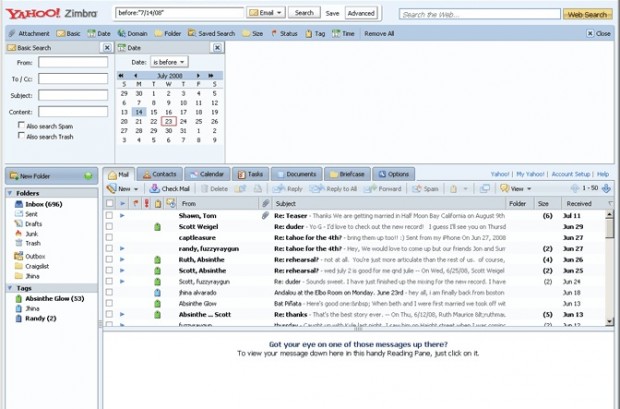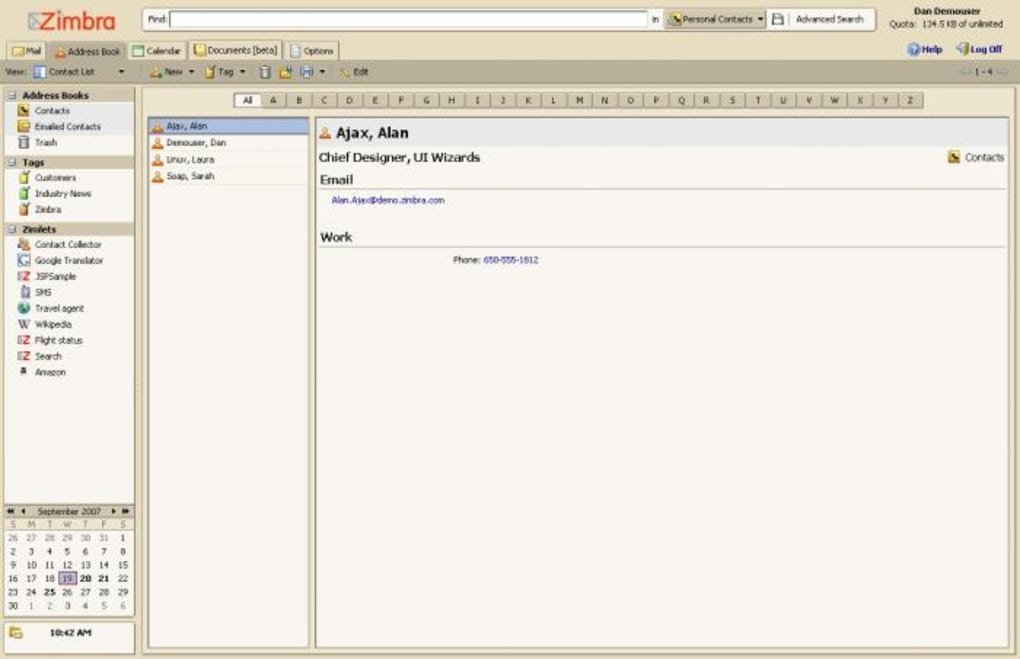
It allows an attacker to inject executable JavaScript into the account name of a user's profile.
#Zimbra desktop 7.1.2 Patch#
This has been fixed in Zimbra Collaboration Suite Network edition 9.0.0 Patch 10 and 8.8.15 Patch 17.Īn issue in /domain/service/.ewell-known/caldav of Zimbra Collaboration 8.8.12 allows attackers to redirect users to any arbitrary website of their choosing.Ī reflected cross-site scripting (XSS) vulnerability in the zimbraAdmin/public/secureRequest.jsp component of Zimbra Collaboration 8.8.12 allows unauthenticated attackers to execute arbitrary web scripts or HTML via a host header injection.Īn XSS vulnerability exists in the Webmail component of Zimbra Collaboration Suite before 8.8.15 Patch 11. In Zimbra Collaboration Suite Network Edition versions < 9.0.0 P10 and 8.8.15 P17, there exists an XXE vulnerability in the saml consumer store extension, which is vulnerable to XXE attacks.

Zimbra Collaboration Suite (ZCS) before 8.8.15 Patch 7 allows SSRF when WebEx zimlet is installed and zimlet JSP is enabled. When grantors revoked a shared calendar in Outlook, the calendar stayed mounted and accessible. Once the token is obtained, an attacker could redirect a user to any URL via isredirect=1&redirectURL= in conjunction with the token data (e.g., a valid authtoken= value).Īn issue was discovered in Zimbra Collaboration Suite (ZCS) before 8.8.15 Patch 7. To exploit the vulnerability, an attacker would need to have obtained a valid zimbra auth token or a valid preauth token. An XSS vulnerability exists in the login component of Zimbra Web Client, in which an attacker can execute arbitrary JavaScript by adding executable JavaScript to the loginErrorCode parameter of the login url.Īn open redirect vulnerability exists in the /preauth Servlet in Zimbra Collaboration Suite through 9.0. This markup becomes unescaped, causing arbitrary markup to be injected into the document.Īn issue was discovered in Zimbra Collaboration Suite 8.8 before 8.8.15 Patch 23 and 9.0 before 9.0.0 Patch 16. An attacker could place HTML containing executable JavaScript inside element attributes. The value of X-Host header is not checked against the whitelist of hosts Zimbra is allowed to proxy to (the zimbraProxyAllowedDomains setting).Īn issue was discovered in ZmMailMsgView.js in the Calendar Invite component in Zimbra Collaboration Suite 8.8.x before 8.8.15 Patch 23.

The value of the X-Host header overwrites the value of the Host header in proxied requests. This markup becomes unescaped, causing arbitrary markup to be injected into the document.Īn issue was discovered in ProxyServlet.java in the /proxy servlet in Zimbra Collaboration Suite 8.8 before 8.8.15 Patch 23 and 9.x before 9.0.0 Patch 16. These memcache commands becomes unescaped, causing an overwrite of arbitrary cached entries.Īn issue was discovered in the Calendar feature in Zimbra Collaboration Suite 8.8.x before 8.8.15 patch 30 (update 1), as exploited in the wild starting in December 2021. Zimbra Collaboration (aka ZCS) 8.8.15 and 9.0 allows an unauthenticated attacker to inject arbitrary memcache commands into a targeted instance. An authenticated user with administrator rights has the ability to upload arbitrary files to the system, leading to directory traversal.

#Zimbra desktop 7.1.2 archive#
Zimbra Collaboration (aka ZCS) 8.8.15 and 9.0 has mboximport functionality that receives a ZIP archive and extracts files from it. A reflected cross-site scripting (XSS) vulnerability in the /public/launchNewWindow.jsp component of Zimbra Collaboration (aka ZCS) 9.0 allows unauthenticated attackers to execute arbitrary web script or HTML via request parameters.


 0 kommentar(er)
0 kommentar(er)
